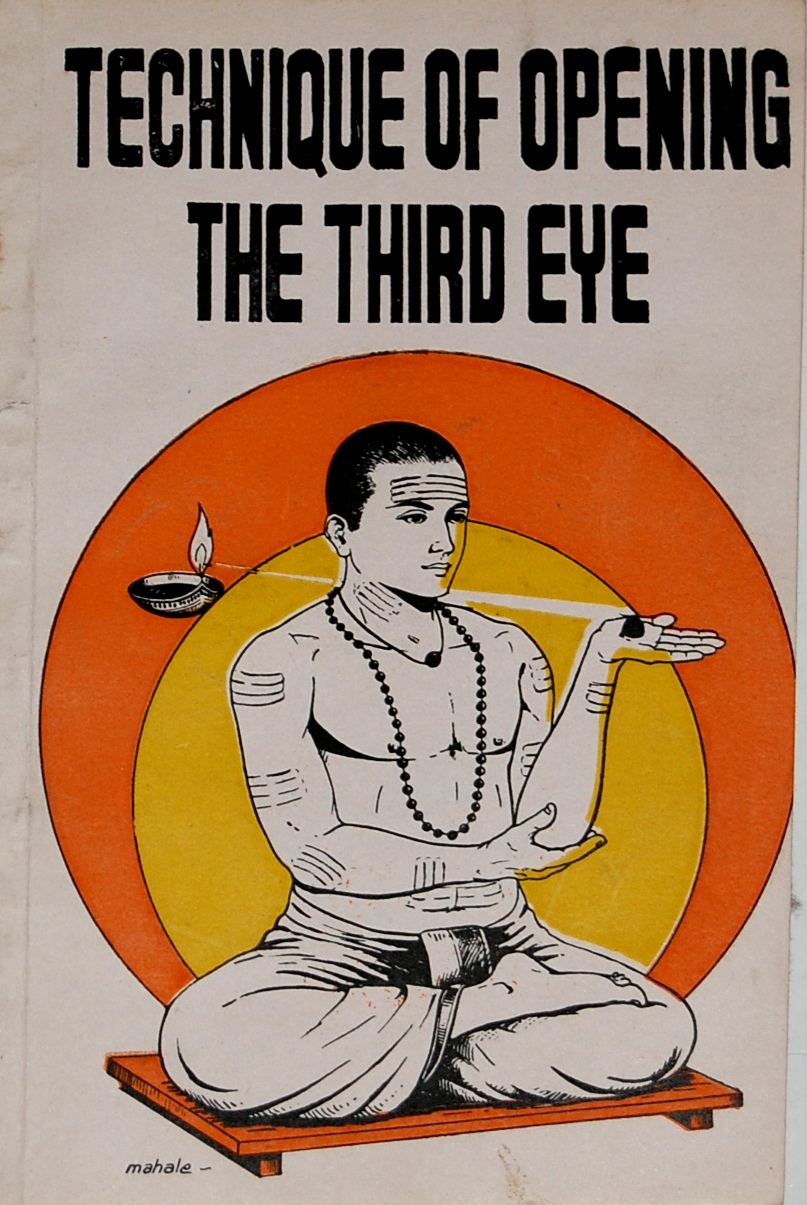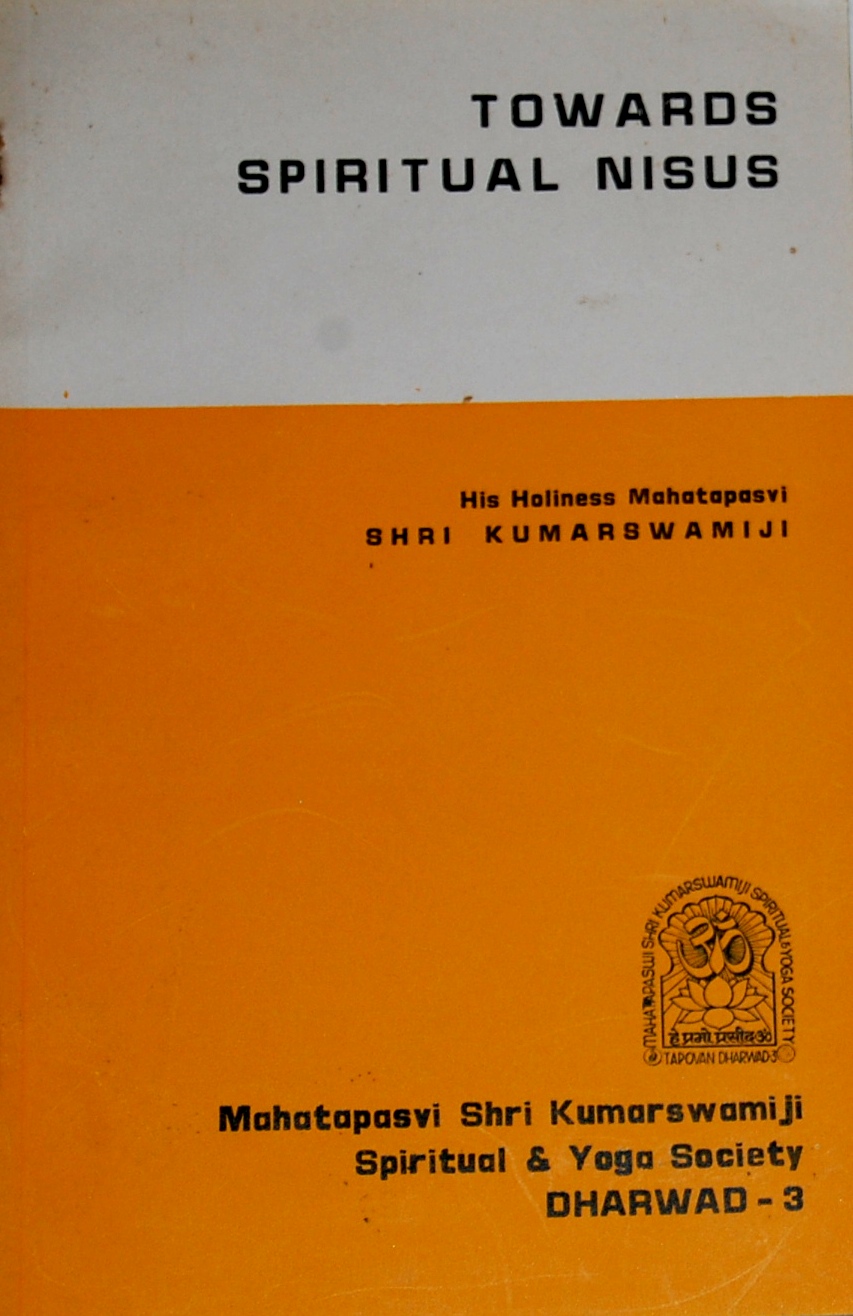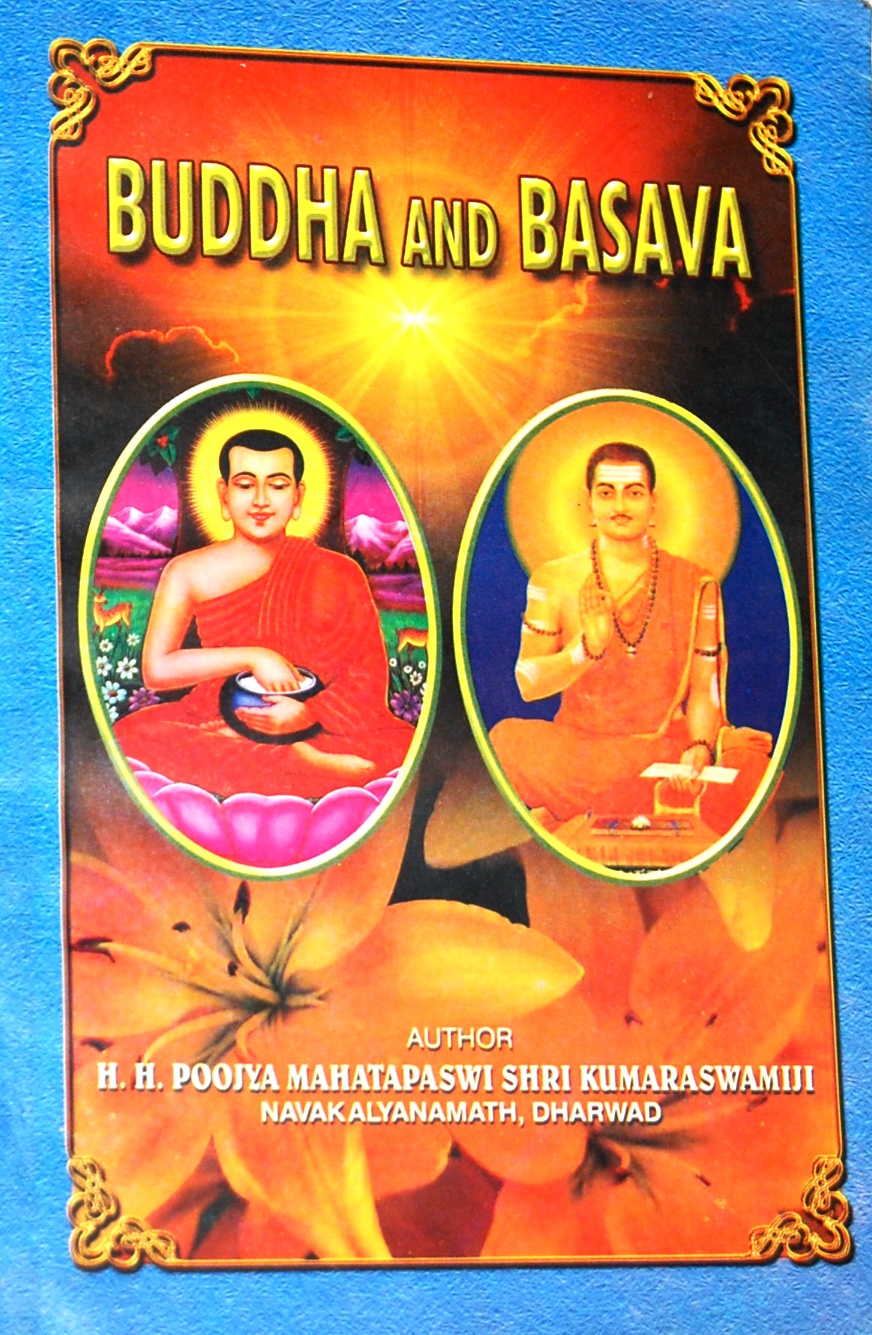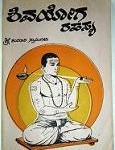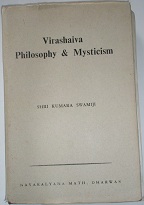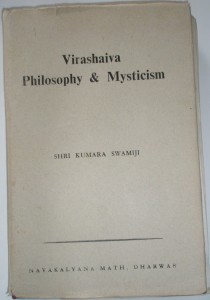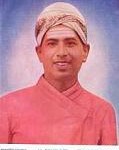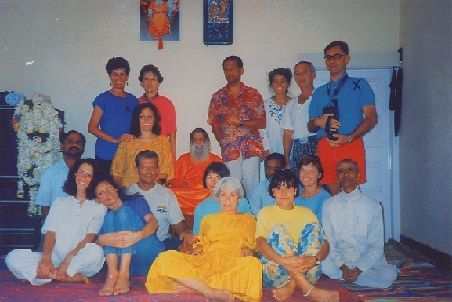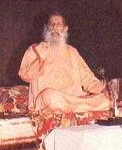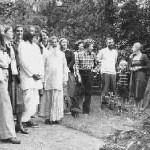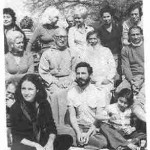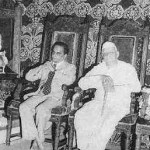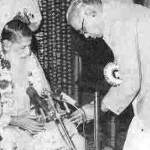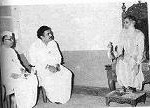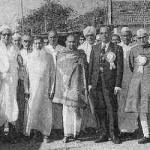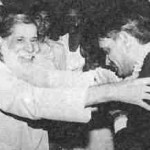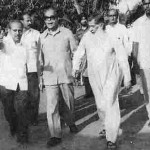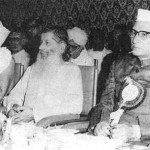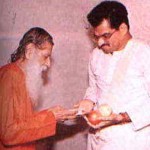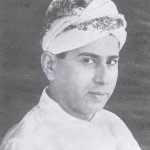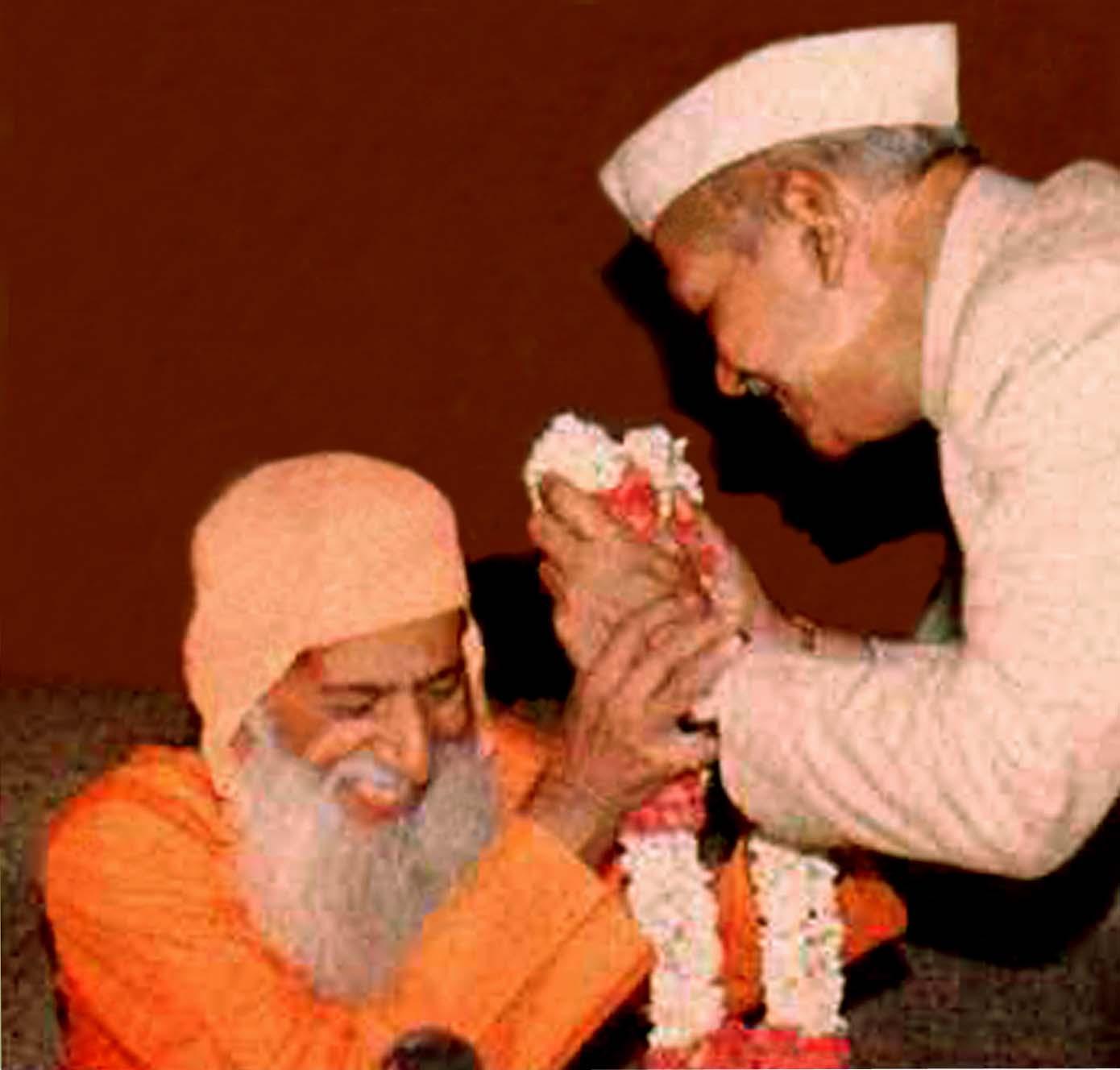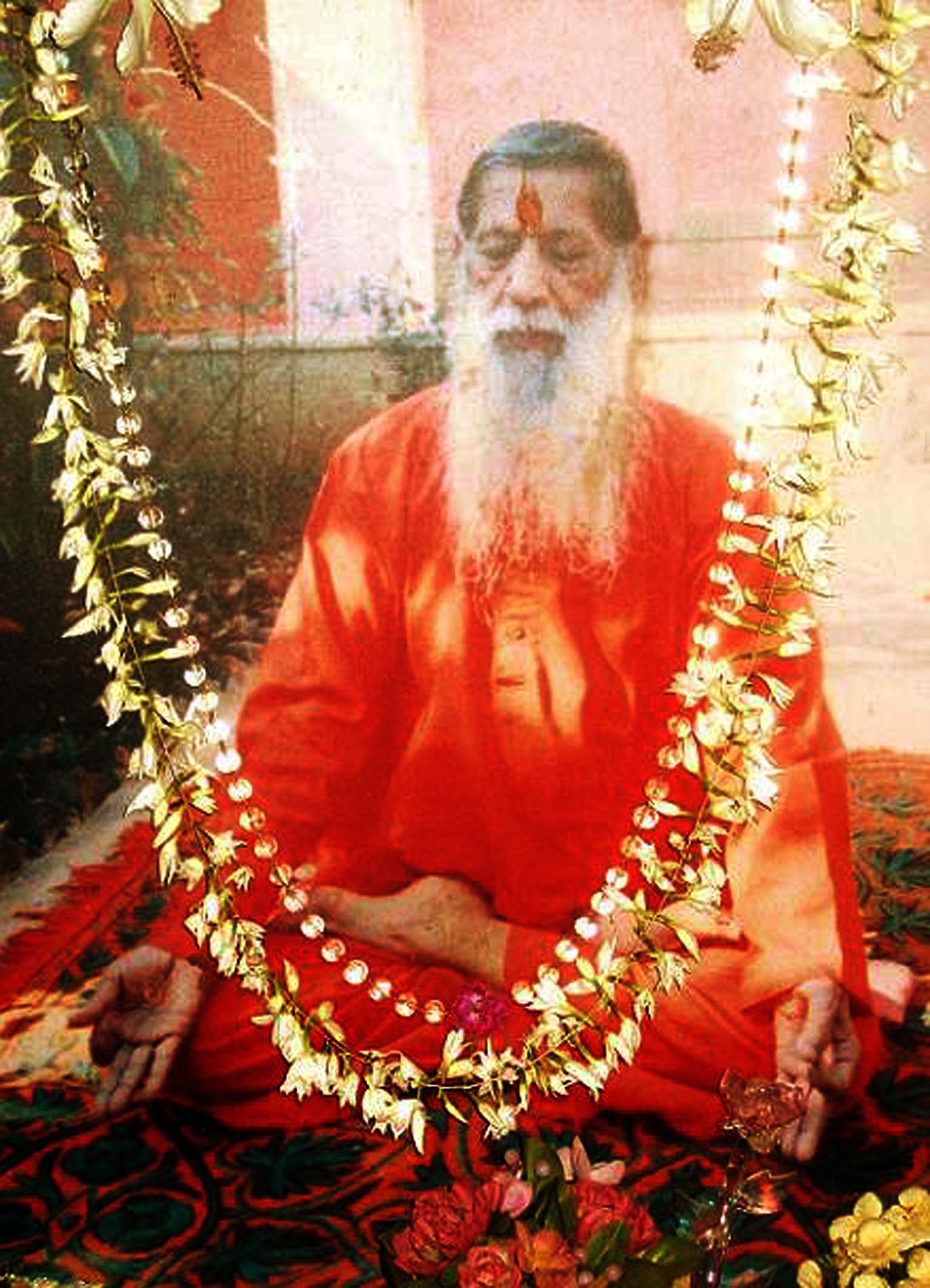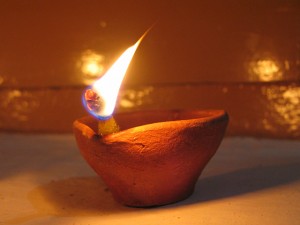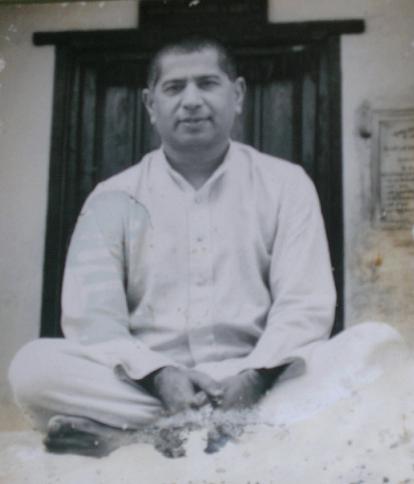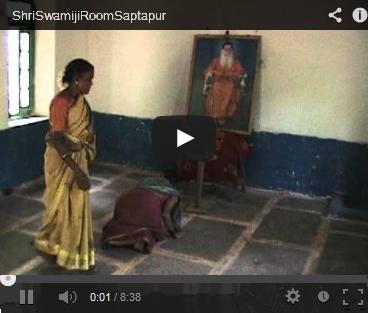Moral solidarity is infinitely superior to material solidarity. But unfortunately this moral solidarity is lacking in the present day socialism. That is why communism and the so-called socialism have crumbled and tumbled to pieces even after seven decades of trial and error and the use of brute force to regiment people under the state-run system. Basava laid great emphasis on the moral solidarity as the corner-stone of the edifice of real humanism. It is said that the truth like light always travels in a straight line. Hence it is the qualities of straight-forwardness, simplicity, sincerity and the like moral virtue that leads us to the realization of the self. Basava exemplified these eternal values better than anybody else.
Basava lived during the 12th century in Karnatak. He was King Bijjala’s Prime Minister. Bijjala ruled over Kalyan from 1157 to 1167. Kalyan is now a part of the State of Karnatak. Basava was a ‘precursor’ of Lingayatism or Veerashaivism, the adherence of which number more than twenty millions. The majority of them live in Karnatak and the rest of them are all scattered all over India. Basava was a great prophet indeed, for in him we find a combination of rare qualities. He was a mystic by temperament, an egalitarian by conviction, a statesman by profession, an idealist by choice, a humanist by compassion and a literary person by taste. At the time of his appearance, the conditions of the social life of India were decidedly below the expected norm, so he had to fight against the odds of the existing social life. In the history of mankind, one notices that all saints have fought against the existing human bias and baseness, against the insidious distinctions and distractions of the social life, against injustice and exploitation of man by man. Nearly all of the saints have exhibited the courage of their conviction, simple-mindedness, selflessness and intense honesty in the pursuit of human welfare. All this has endeared them not only to their countrymen but to the mankind-at-large. Since they affirm global humanism, not limited by the narrow-minded provincialism of caste, creed, colour and country of origin, they are universally loved and respected. They see in the individual being a spark of Divinity shining with equal brilliance and brightness.
The word “humanism” is usually associated with the name of August Compte. In fact he was the propounder of positivism which rules out the concept of Deity. He erected humanity as an object of worship in place of God. Eighteenth century witnessed the French Revolution which loudly and proudly proclaimed the noble thoughts of liberty, equality and fraternity. It also gave a great fillip to humanism and humanitarian ideals. Yet, there undoubtedly is a great difference between the humanism of the 18th century encyclopediaists and the humanism of the saints and the sages.
The ideas of humanity as a single race of beings with a common purpose of life, is among the most characteristic and significant outcomes of modern thought. Humanism is, therefore, an attempt of the human mind to grow out of the confines of the national limitation and boundary in the interest of the larger synthesis of mankind. This idea of humanism born of the 18th century found some expression and voice in the initial stages of the French Revolution. But at that time, it was rather a vague intellectual sentiment than a clearly defined and implantable idea and as such did not find a meaningful purpose in life. During the 19th century, we see the idea of humanism growing again in the minds of the thinkers, sometimes in a modified version, sometimes as a pure idealism, allying itself with the growing forces of socialism and anarchism, it took a body and a recognizable vital force. In its absolute form, the internationalism of the intellectuals intolerant of nationalism as a narrow spirit of the past and contemptuous of patriotism as an irrational prejudice. It is found on a view of things which looks at a man in his manhood only and casts away all those physical and social accidents of birth, rank, class, colour, creed and nationality. The idea of humanism seeks to abolish all these paraphernalia by putting man face to face with man on the basis of common human sympathy, aims and interests.
There are many conditions and tendencies in human life at present, which are favourble to the progress of the humanistic idea and especially drawing closer the knots of international life, multiplication of the points of contacts and threads of communication and the increasing community in thought, science and knowledge. Science has been a great force in this direction, for science is common to all men in its manifestation and open to all minds and methods. Its results benefit all, irrespective of their inclinations and intentions. It is international in its scope and content, nature and manifestation, not limited by national boundaries and demarcations, although each country makes its own contributions to the overall progress of science. It is therefore easier for men of science to grow into a humanitarian spirit. Science has also created that closer contact of every part of the world with every other part, out of which some kind of international bent of mind and kinship are growing. This growth of knowledge is interesting the people in each other’s art, culture and religion breaking down the barriers of prejudice, arrogance and exclusiveness of the old nationalistic sentiment. Religion is now beginning to realize a little dimly and ineffectively as yet, that spirituality is after all its own chief business and true aim and that is also a common element and the common bond of all religions. As these tendencies grow and come more and more closer consciously to cooperate with each other, it may be hoped that the necessary psychological modification will quietly produce itself preparing a real change in the life of humanity.
The fundamental idea of humanism is that mankind is the God-head to be worshipped and served by man and that the respect, the service, the progress of the human being and human life are the chief duty and primary aim of the human spirit. Neither any other idol, nor the nation, the state, the family and any thing else ought to take its place, they are only worthy of respect so far as they are images of human spirit and enshrine its presence and aid its self-manifestation. No injunctions of the old creeds-religious, political, social or cultural � are valid when they go against the claims of humanism. Man must be sacred to man regardless of all distinctions. The body of man is to be respected, made immune from violence and outrage, fortified by science against disease; the life of a man is to be held sacred and noble. All this too is not to be held as an abstract or pious sentiment, but given full and practical recognition. This, speaking largely, is the idea and spirit of orthodox humanism.
India’s Prime Minister Dr. Manmohan Singh released coins commemorating Basava.
What are then its practical results? It is largely humanized society, humanized law and punishment, humanized outlook of man on man, abolition of legalized tortures and baser forms of slavery and bondage of man by man. It has given a new concept of the dignity of the human being and opened up new vistas of his education, self-development and potentiality. It had given hope to the surf, self-assertion to the down-trodden and made the laborer the potential equal of his rich and powerful counterpart. But if we compare with what is with what should be, the actual achievement seems only a scanty work of preparation. Yet it is a remarkable record during these two centuries, for an unembodied spirit which had to work through the instruments at its disposal, there is a serious weakness in this idea of humanism, the weakness of orthodox humanism, even when it supports itself by an appeal to the sentiments and emotions, is that it does not get at the center of man’s being. The aim of humanism was formulated in the 18th century by a sort of primal intuition; that aim was and still is to recreate human society in the image of three great kindred ideas of liberty, equality and fraternity. None of these has really been won in spite of all the progress that has been achieved. This is because the idea of humanism has been obliged to mask its true character of religion that is spirituality. It has labored only to establish a political and social liberty, equally and mutual help in an equal association. Though these aims are of great importance in their own field they are not the central thing, they can only be secured when founded upon a change of the inner human nature and an inner way of living. They are themselves of important only as a means for giving a greater scope and better field for man’s development towards that change. Liberty, equality and fraternity are the three goals of an yearning soul. When the soul claims freedom, it is the freedom of self-development, the self-development of the divine in man in all its spelndour and being; when it claims equality, what it is claiming is that freedom equally for all and the recognition of the same soul in all human beings; and when it strives for fraternity, it is looking for equal freedom of self-development as a common aim, a common life based upon the recognition of this inner spiritual unity and oneness. This is the idea of real humanism as envisioned by saints and sages.
What, then, are the implications of real humanism?
The first implication. is that the accident of birth does not make one great. It is not the birth but the worth of the soul that makes one great. It is not the birth but the worth of the soul that determines the greatness of an individual. This is the motto of the saint. He proclaims that it is neither the wealth nor the rank, neither the gender of the individual, nor the position that deserves reverence but it is the virtue within the individual that is worthy of worship. In a country that is caste-ridden, it is very difficult to establish the supremacy of virtue. Even in the teeth of opposition, Basava did achieve this arduous task. In the Anubhava Mantapa or Spiritual Academy virtue reigned supreme relegating the caste, the gender and social status distinctions to the lumber room. He established the Anubhava Mantapa on the three cardinal principles of enlightened reason, self-experience and service to humanity known as Guru, Linga and Jangama in Veerashaivism. The institution of caste and its inevitable notion that some castes are high and others low has been in existence in India for thousands of years! Whatever may have been its historical significance, it has long been lost, though it was used for a long time as an instrument of oppression and exploitation. This directly led to invidious social distinctions which achieved acute proportions. Those who considered themselves to be superior were actuated by conceit, huagntiness and desire to dominate the rest of the populace; while those who felt themselves to be inferior lost their self respect, dignity and self-confidence and thus became slaves to slavish mentality. Caste system has been perhaps the greatest impediment to economic, political and social justice and progress of India. First it was defended on the basis of division of labor, because division of labour was and is a necessary feature of every civilized society. Caste system was not and is not a division of labour but a compartmentalization of the uneducated and uninformed individuals into eternal bondage. This created stratification of professional occupations. However, the industrial and professional occupations are never static and undergo a continuous but perceptible change. This change dictates that an individual must adapt in order to succeed. The caste system denies this human right. In the recorded history of India, three great personalities � Buddha, Basava and Bapuji (Gandhiji) � rose in revolt against caste system and untouchability. But in the 12th century the most imaginative and revolutionary movement that this world has ever seen was initiated by Basava and his contemporaries by bringing about a matrimonial alliance between the son of a cobbler, named Haralayya and the daughter of a Brahmin, named Madhuvayya. This even bore eloquent testimony to the courageous outlook and progressive mindedness of Basava, who proclaimed and practiced “social equality” in the true sense and meaning of the word.
The second implication is that he unequivocally equated work with worship. All professions geared to promote the well-being of the society and community was considered benevolent and equal in status by Basava. This uplifting of the status of the so-called menial occupations to that of the prime minister of the state was an ennobling and unprecedented act in the annals of Indian history. He further proclaimed that labour rendered in the spirit of service to God and man rid us off three great evils, irksomeness, vice and poverty. He practiced the dignity of manual labour by giving it a religious significance, a significance and connotation much greater than the 16th Century Protestant ethics of work. He said all labour, high or low, is the same in the eyes of God, Said he, “A man works with iron and thereby becomes a black-smith; a man washes clothes and becomes a washer-man; a man weaves a cloth and becomes a weaver; and a man reads the Vedas and becomes a Brahmin.” The occupation of a Brahmin, a namely preaching and that of a janitor are equal, provided this work is performed in the spirit of service to God and humanity. Basava insisted that every member of the community must pursue some occupation suited to his temperament and earn his bread by the sweat of his brow and labour. It was his considered opinion that even the Jangamas or the priests who are supposed to have renounced all worldly attachments, must engage themselves in useful occupations instead of being a useless burden to the society by indulging in begging to eak out a living. The propagation of this dignity of manual labour gave a stimulus to the development of arts and crafts of the land and removed the curse of idleness from the society.
The third implication is that of the idea of heaven and hell. The saint discards the mythological concept of heaven and hell; he rejects outrightly and summarily the spatial idea of heaven and hell, the idea that hell is in neither a world connected with all sorts of filthy things and that heaven is situated far above in the sky associated with all the fairy tales. Basava says that righteous conduct is heaven and sinning conduct is hell, in the sense that heaven means harmony and happiness; and hell means inharmony, unhappiness and misery. Every where in the Nature, there is harmony and rhythm. It is the rhythmic movement in nature that gives rise to music, which in turn gives rise to joy and beauty. There is sweetness and adorable beauty in nature. One witnesses Nature’s bountiful beauty in the balmy breeze, in the colourfl dawn and sunset, in the rainbow hue and in the chirping of the birds and the morning dew. There is again the breathtaking beauty of the snow-clad mountain, in the pristine river, in the twinkling stars, and the blooming flower. Nature is beautiful with the splendor of the abysmal main, in the refreshing rain-shower, in the star spangled sky and in the endless horizon across the mighty ocean. Nature is beautiful with the beauty of the embracing mother, of the protecting father, of the enlightening perception of the devoted and loving spouse, of the trusting child and of the unfailing companion. Nature is not only sweet but also stern, not only tender but also terrible. No one can break the laws of nature with impunity and stay without regret and remorse. There is a saying to the effect that nature is conquered not by defiance but by obedience to her will. Study the laws of nature and obey them, then you will find nature’s kindness and motherly tenderness. Nature’s laws include physical, chemical, social as well as moral and spiritual laws. We can break these moral and spiritual laws at our own risk and peril. To lose the link of nature’s moral evolution is a capital fault in the advocacy of modern science, for only out of the unavoidable line of evolution can that emerge in the bosom of humanity long tested, ripened and purified by the fire of egoistic and altruistic suffering. The righteous conduct puts you in tune with the divine law and evil conduct throws you out of gear and hence out of harmony with nature’s laws. Consequently you suffer and suffering is only an indication that you are out of tune with the law. Basava therefore insists upon righteous conduct, purity of thought, word and deed.
The fourth implication is that of a rapprochement between this world and the next world. Real humanism affirms that there is no hard and fast line between here and hereafter, between this world and the next world. Basava exclaimed thus, “This world is the workshop of the creator. Those who are accepted here will be accepted there also, but those who are rejected here will be rejected there.” The upshot of this saying is that whatever is useful and beneficial for life in this world is also consistent with the well-being of life in the next world. Real humanism does admit a graduated scheme of the creation. In this scheme of creation, though there is a distinction between the high and the low, there is not a disparity. There is an upward trend of evolution, there is a steady climb of life from the inorganic to the organic, from the organic to the sentient, from the sentient to the rational, from the rational to the spiritual. If spirit is the summit of life, matter is the basis. The material life is therefore no illusion, that is why Basava laid great stress upon the improvement of the material condition as a stepping stone to the spiritual realization. Basava finds no antagonism between Artha and Atma, between the economic values and the spiritual values. Since there is no break in life, all the values ranging from the material to the spiritual serve to heighten the glory of life. Alfred Marshall, one of the great economists, observes thus, “The two great forming agencies of the world’s history have been the religious and the economic. Here and there the ardor of the military or the artistic spirit has been for a while predominant but religious and economic influences have nowhere been displaced from the front rank even for a time and they have merely always been more important than others put together.” But the divorce between the two has done great harm to the society. Today the face of our society is sacred by the extremes of prosperity and poverty, of affluence and want. If poverty corrupts a few, power corrupts millions. Hegel once wrote to a friend of his, humourously, “I have made my guiding-star the Biblical saying, the truth of which I have learnt by experience, “Seek, ye first food and clothing then the Kingdom of Heaven shall be added unto you”.
Buddha and Basava – The two Luminaries
The fifth implication is that of fraternal bond. Fraternity is the watchword of real humanism. The saint looks upon every being as a means to an end. He looks upon all the souls as the sons born of one father. This father-hood of God and brother-hood of man is the keynote of his teaching. We are all acquainted with the law of gravitation in the physical field. All things on this earth gravitate towards each other because of mutual attraction. What the law of gravitation works in the physical sphere, the law of brother-hood works in the moral sphere. If for a moment gravitation ceases to work, everything on the earth would go to pieces; if the law of brother-hood is scouted and belittled then moral life would be a chaos. This is what we are witnessing today in our social life. Moral solidarity is infinitely superior to material solidarity. But unfortunately this moral solidarity is lacking in the present day socialism. That is why communism and the so-called socialism have crumbled and tumbled to pieces even after seven decades of trial and error and the use of brute force to regiment people under the state-run system. Basava laid great emphasis on the moral solidarity as the corner-stone of the edifice of real humanism. It is said that the truth like light always travels in a straight line. Hence it is the qualities of straight-forwardness, simplicity, sincerity and the like moral virtue that leads us to the realization of the self.
Respect for women is the sixth implication. In the real humanism, woman should occupy a place in a society on an equal footing with man. If we want to estimate the depth of degradation to which a community has sunk, we have only to look at the way in which it treats its women. Crude and savage races treat their women with great severity and cruelty. Basava gave a status of equality and an independent outlook to women in the community, as a result of which a host of women mystic arose and shone in the firmament of religion thought and social life. To name a few of them: Akka Mahadevi, Muktai, Lakkamma, Lingamma, Satakka, Somavve, Remevee, etc. All of these women mystics composed vachanas or sayings and became community leaders. It was a considered opinion of Basava that family is the unit of social life and that woman is an angel of the household. All kinds of relations emanate from the family and the saint who has extended this relationship so as to embrace the whole universe becomes a Vishvakutumbi. A saint is a Vishwakutumbi because his relationships do not stop with the family, he embraces the entire world in his wide sweep as his family.
In the Indian tradition the concept of God is that of Ardh-nari-nateshwara. God is regarded as half man and half woman, meaning thereby man and woman are on a par. Though this is the case, we often find derogatory references to women. This is because we do not properly understand the significance of Ardha-nari-nateshwara. It is true that women cannot do things which men can do, because their physiognomy prevents them to do so. This however does not prove inferiority on their part. The relation of man and woman is the expression of an urge for duality; though there is duality in appearance yet there is unity in reality. Each is a self which requires the other as its partner. The division of sexes is a biological necessity and not a historical event like the division of races and classes. Modern anthropology brings out clearly that marriage and family are found in one form or the other as fundamental institutions in every human society, primitive or civilized. The institution of marriage has been exalted in the Indian tradition. For the Indians a marriage is a sacred samskara, a sacrament and not a contract. Treat your mother as a Goddess is the advice given to the young. But the weakening of the sanctity of marriage and thereby of the family is causing wide spread concerns everywhere. The deterioration is gradually increasing in our country. To check it, we only have to adopt higher standard of education and moral instruction not merely for women but also for men.
In certain periods of Indian history, the education of women was sadly neglected and thereby women lapsed into illiteracy and superstition. Writing to Sister Nivedita in 1897 Swami Vivekananda said, “Let me tell you frankly that I am now convinced that you have a great future in the work of India. What is wanted is not a man but a woman, a real lioness to work for Indians. If India cannot produce great women, she must borrow them from other nations.” If Swami Vivekananda complained that India could not produce great women, it was because of the degradation to which they were subjected in recent times. We have wasted women’s gifts by failing to recognize them as human beings. But if Swami Vivekananda had been aware of the social revolution wrought by Basava with the elevation and independence of the woman-hood as its guiding principle, he would not have written in that strain to Sister Nivedita. The Times of India, in its issue of May 17, 1918 paid a glowing tribute to Basava by stating thus: “The present day social reformer in India is but speaking the language and seeking to enforce the mind of Basava.”
The seventh implication is that of an ideal placed before the individual and the community. In spite of all the efforts to scoff at ideals and idealism, man cannot do without some kind of futuristic idealism. It is in the very nature of man to look before and after. The human mind which looks before and after the great of ideal past competes itself only by a greater dream of the ideal future. Man refuses to make an ideal of the present; he looks backward to the mighty past and forward to the still mightier future. Hence, it is natural for every individual as well as for every community to try for the acquisition of the four-fold values, namely Dharma (righteousness), Artha (wealth), Kama (desire or love) and Moksha (salvation or self-realization). Kama is the hunger of the physical senses, because the physical senses thirsting and lusting for the enjoyment of sense objects. Artha is the means for quenching it. Similarly Moksha is the hunger of the soul, for there is an intense desire of the soul to free itself from persistent siege of the phenomenal association. This expresses itself on the aspiration for liberation from the bondage to worldly life. Dharma is the means of quenching the hunger of the soul. If Kama and Artha are related to prosperity and material well-being, Dharma and Moksha are concerned with salvation and spiritual well-being. The individual, in whom this four-fold is harmoniously blended, is to be considered an ideal one. It is an undoubted fact that inspite of the traditions, customs, manners and religious injunctions, the lives of great saints will have a profound influence on the generations to come. Only men of right vision and right conduct are competent to be the leaders of the community and the nation. Plato said that philosophers should be kings. Here philosophy should not be taken in an academic sense or its dictionary meaning, its etymological meaning is the love of wisdom. Those who are wise both in thoughts and actions, in words and deeds alone are entitled to be the leaders of the community or the nation.
A nation is truly built by its educational institutions; the youths should therefore be trained properly. Today in the educational environment, one witnesses a low moral, dissatisfaction and defeatist mentality among the students. There is, on the part of students, a total lack of understanding of their responsibility. They lack a sense of purpose, direction and dedicated commitment to learning and pursuit of knowledge. They tend to forget the sacrifices their parents are called upon to make in order that they can get a decent education and have a bright future. The low esteem in which the teachers are held today is an eloquent testimony for the malaise afflicting our society. Respect for the teachers cannot be ordered from without but it must be earned from within, for the teachers belong to the Guru Parampara. Added to this, the politicians have muddled the already dirty water. In India, education has become the hotbed of corruption, inaptitude and acquiescence on the part of teachers. The teachers should rise above the petty mindedness and be real role models to their students. We are now living in a scientific age and mere scientific learning is precarious and conditional. If we turn out to be only learned without truly being cultured we then become a danger to the society. Respect for the basic spiritual values is the only antidote to the distempers of our society. The saint is, therefore, the guardian of spiritual values. The message of the saint often comes to us like a breeze laiden with fragrance. Often, he reminds us of the fundamentals of ethics, that love is better than hatred, peace is better than war, cooperation is better than conflict, persuasion is better than force and gentleness is better than violence.
Basava exemplified these eternal values better than anybody else.
This article is taken from H.H.Shri Kumarswamiji-s book, ‘Veerashaivism: Comparative Study of Allama Prabhu, Basava,Shunya-Sampadane and Vachana Shastra’.








